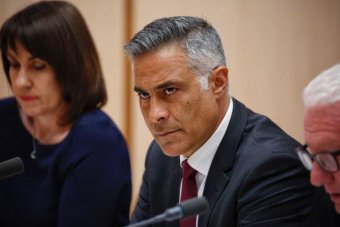Australia Post chairman admits it was a 'mistake' to conceal CEO's pay packet
Updated
Australia Post chairman John Stanhope admits it was a mistake to try and hide its director's $5.6 million pay packet from the public to avoid media scrutiny and reputation damage.
CEO Ahmed Fahour resigned from the Government-owned business just weeks after his multi-million-dollar salary was revealed by a Senate committee, which dismissed calls to conceal it.
"The mistake was that even though we didn't have to disclose, it was probably a good thing to disclose," Mr Stanhope said.
"The reason is it is obvious that the business is not understood well enough, and it is important to have people understand it."
Mr Fahour told a Senate estimates hearing he had been considering his resignation for some time and the public criticism of his salary "certainly sharpened his mind" about the decision to leave.
But he said no-one had asked him to resign after his salary was revealed and he was not pressured to leave the job.
"If I was pressured, I probably wouldn't have resigned to be honest," he said.
"I would have deliberately stayed, I would have worked for zero pay just on that principle basis."
His salary is 10 times more than the $507,338 Prime Minister Malcolm Turnbull is paid, and considerably more than the heads of other comparable postal services.
Mr Fahour said it was one of his job's "greatest delights" to appear before Senate estimates for questioning.
Australia Post has now released a detailed report revealing all executive salaries, which reveals another three people are paid more than $1 million a year.
Mr Stanhope detailed a phone conversation with Mr Turnbull and said the Prime Minister told him that "the CEO's salary was too high".
But the chairman rejected claims he was pressured to push Mr Fahour out of the job, and said the Prime Minister did not issue an ultimatum.
Mr Stanhope said Australia Post was unlike any other organisation in Australia and needed to balance commercial incentives with a core public service.
He said Australia Post needed to offer attractive salaries to attract the best talent to the organisation.
Minutes after Mr Fahour's resignation was publicly announced last week, the Government ordered the independent remuneration tribunal to oversee the salaries of Australia Post executives.
"The Australia Post board will need to demonstrate to the tribunal that their proposed remuneration package is commensurate with the responsibilities of the role," Finance Minister Mathias Cormann and Communications Minister Mitch Fifield said in a statement.
Greens Senator Richard Di Natale asked Mr Fahour whether he believed his Islamic faith played any role in public criticism of his salary and tenure.
One Nation Senator Pauline Hanson criticised Mr Fahour's $2 million donation to a Islamic charity in 2014.
Mr Fahour said he found the comments sad and ill-informed.
"I also felt that it was quite hurtful to my wife who is English-Irish and went to a Catholic school and my four beautiful children who have grown up and were born all over the world," he said.
"We love our country, we love our country so much."
Earlier in the day Communications Minister Mitch Fifield was grilled about why he did not know the specifics of Mr Fahour's salary.
Senator Fifield told the committee he did not have a role in setting salaries and that Mr Fahour's package was determined by the Australia Post board.
Topics: federal-government, business-economics-and-finance, public-sector, australia
First posted









